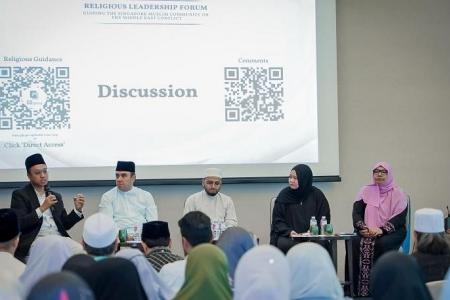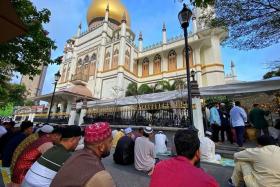Muis to issue advisory on dealing with overseas conflicts like Israel-Hamas war
A religious advisory to guide Muslims here on their response to overseas conflicts such as the ongoing one between Israel and Hamas is being developed by the Office of the Mufti, under the Islamic Religious Council of Singapore (Muis).
The advisory, to be released at a later date, aims to help the community process information related to such conflicts, as well as gain an accurate understanding of the Quran and prophetic traditions, Muis said.
Mufti Nazirudin Mohd Nasir told reporters that the advisory is meant to help Muslims look at the impact of such conflicts on their religiosity, and how best to manage that impact in a “wise, constructive and positive way”.
He was speaking on the sidelines of the Religious Leadership Forum 2023: Guiding the Singapore Muslim Community on the Middle East Conflict, held at the Royal Plaza on Scotts on Thursday.
Attended by about 120 local asatizah (religious teachers), the forum was organised by Muis, together with the Singapore Islamic Scholars and Religious Teachers Association (Pergas), the Religious Rehabilitation Group (RRG) and the Asatizah Youth Network.
The event aimed to provide an understanding of the issues related to the Middle East conflict from the local religious perspective, as well as discuss ways in which religious organisations here can guide the Muslim community in dealing with the issue.
The conflict began on Oct 7 when Hamas launched a surprise attack on Israel and killed at least 1,400 people.
Israel has since declared a “state of war” and launched strikes on the Gaza Strip, killing at least 9,000 so far.
On Oct 27, Singapore voted in favour of a United Nations resolution to protect civilians and uphold legal and humanitarian obligations amid the conflict.
“It’s very important to continue to be with our community to provide the right avenues to help them deal with the impact of the conflict on themselves emotionally as well as spiritually,” said Dr Nazirudin.
This includes encouraging Muslims to pray for peace and resolution to the conflict, as well as participate in humanitarian efforts to help victims.
Muslims should also continue to strengthen their relationships to show that “peaceful coexistence is possible amidst diversity”, he said, noting this is a challenge faced by many societies.
RRG co-chair Mohamed Ali said it is important to validate feelings such as anger and frustration that may arise among both Muslims and non-Muslims amid the current conflict in Gaza.
Not addressing such sentiments could lead to extremism, he said, noting there had been previous instances of self-radicalisation here triggered by the Israel-Palestine conflict.
“Moving forward, there is a dire need for our young people not only to understand and comprehend the conflict in its proper perspective, but they also need to be guided in terms of how they can manage their emotions,” he said.
Pergas’ president, Ustaz Muhammad Tarmizi Abdul Wahid, noted that anecdotally, there have been cases of people leaving their jobs in Israel-linked companies as a show of support for the Palestinian cause.
Doing so without an alternative source of income, though, would mean they neglect their responsibilities to their families, he noted.
Religious teachers need to be able to address such concerns and guide Muslims here to contribute positively to the humanitarian crisis, he added.
Get The New Paper on your phone with the free TNP app. Download from the Apple App Store or Google Play Store now



